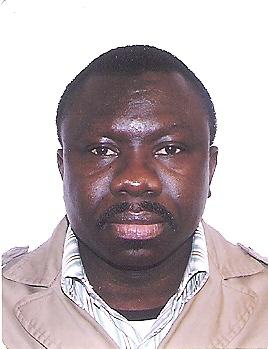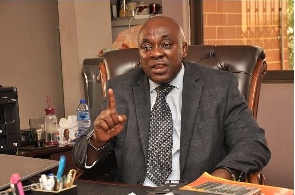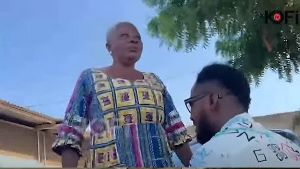
When you desire something desperately and you work hard to achieve it, the Calabar people of Nigeria call that thing an Irom. Iroms are rare commodities, because, often times, people are caught up in the tortuous routines of daily existence, and they live as though there are no Iroms at stake. So, when I met Irom Arekong, a communications professional from Nigeria who had come to Ghana to work in the advertising industry, I knew there was something special about him. Nigerians love their Mercedes, and he owns one, a V Boot. At 8.00 every morning, he navigates his way through the vehicular traffic on the roads of Dansoman to Lartebiokorshie, where his Advertising agency is situated. He is a copywriter, and his schedule is a rather difficult one: he has to enter into the marketing thinking of the people of Ghana, by combining words and phrases to produce creative messages for radio, television and newspaper advertising. His publics may speak English, but they often treat the language as a ‘superstrate’, in which case the substrate is the widely spoken Twi language. Irom speaks no Ghanaian language but he has to write his messages to appeal to the uneducated Ghanaian who cannot speak English at all. He is a professional, so he knows how to go about it, being an Irom himself. At 5.30pm, he makes the same journey back home. He has lived this routine for many years among people who do not eat Edikanko or Eba and Ogbono soup. His neigbours are comfortable with Dokono and Kpakpo shito in the afternoons, and fufu and Abenkwan in the evenings. Together, they make a lovely multicultural experiment. Must his being a Nigerian worry his neighbours? His car still has a Nigerian number plate, but he is not less a Dansoman resident than Mr. Tetteh Torto, who built the community.
Is it necessary to build fences if we trust our neighbours? If we would ever have to build fences, they should be good ones, and not as barricades to prevent our neighbours from infesting us with their very humanity. This is the lesson that ‘Mending Wall’, a very old poem, sought to teach. Sure, good fences make good neighbours, and good neighbours make good fences and sometimes no fences at all. Irom made a good impression on me when I worked with him in Ghana. I learnt the art of copywriting under him. I did not gain much in terms of expertise, because that trade has nothing to do with bland creativity; it has everything to do with the consumer’s understanding of creativity in marketing communications. I wasn’t prepared to speak the language of the consumer, because I had my own language, a language that is taking too long to become my Irom. But I learnt something very important from the Nigerian copywriter: his warm, unassuming nature and his kindness, the born-again Christian that he was. So, when I came to the United Kingdom, I had become so used to that very good Nigerian nature that I considered marrying a Nigerian the Irom of my sojourn in the West. Soon Cupid struck. I met Bolaji, a Yuroba LLB student at Middlesex University, where I was also studying for a Master of Laws degree. She was so sweet she nearly turned me into a gigolo. Not a gigolo in the sense of a paid sexual accompaniment; only in the sense of a sexy buffoon tied to a female’s apron strings. Nigerian films replaced Grace Nortey and McJordan’s theatrical antics. I swapped Ghanaian restaurants with Nigerian eateries. I even changed my church for Pastor Ashimolowo’s chapel. To cap it, I wrote to my very Ghanaian sweetheart, Odoyewu Akua Owusuaa, urging her to think of herself as Mrs. Victor Smith, by drafting her own dismissal letter to quench the suffering romance.
Is there any reason why Ghanaians should be wary of the Nigerians living in Ghana? Some Ghanaians living abroad are as worried as some culturally hypersensitive folks in Ghana, who are eager to build fences to ward off the West African brothers and sisters from Ibadan and Ikeja. When it becomes necessary to refer to people who live amongst us as ‘these’, ‘those’ and ‘them’, then we are warming up to a siege mentality. And when a people find reason to feel threatened in the land of their birth, because of the presence of other people, they only have two things to fear: themselves and their sense of community. Of course, hospitality is another thing. How hospitable have we been all along anyway? We would extend to strangers favours that we would deny the blood brother next door. What has changed this time when globalization is only next door?
“They are buying houses at choice locations in the capital; they are penetrating the very core of business and extending branches everywhere; they have an itchy nosiness and a native curiosity for money; they are giving their children expensive education; we don’t know what they do for money, but they seem to have a lot of it.” These were the sentiments of a middle-aged Ghanaian I met at a seminar in London. I asked him: “Has anybody stopped you from developing any business in Ghana? He waffled a response that neither sounded like a kleptomaniac’s definition of morality nor a lazy man’s understanding of existentialism. “They are not wanted anywhere; they are 419 people. They are trooping in because of the oil. They have messed up theirs and now they come scrambling for ours,” he submitted. I was quick to point out to him the number of ‘theys’ he had mentioned in a single submission. It should be a lot easier if he talked about himself, because he would only have to use a personal pronoun, to save some energy.
The Public Relations Officer of the Nigerian Community did well to have spoken to clear these artificial fences. Is there such a thing as a bad people? There are the good and the bad, and sometimes the not so bad in every culture. It wouldn’t be fair to think of the entire Nigerian community as bad nuts just because there are a few dodgy ones among them. At least, we know that Mr. Atta Ayi is not Nigerian; he had been practicing his trade before our visitors arrived. And he had quite a following, too. Mr. Samuel Mills-Robertson, the driver who was hired by Nigerians to cart slabs of cocaine from Bogoso through Cape Coast, may be a fellow Fanteman, judging by his name. His arrest this week by the Cape Coast MTTU pleased everybody, and those police officers who rejected his $5,000 bribe, need a big pat on their tired shoulders. Most of us know one or two Atta Ayi’s who have lived above reproach for so long. Armed robbery is on the increase. It is dangerous to drive on otherwise peaceful roads, even during day. So, who do we blame for all these? Well, maybe we are better off blaming the evils of capitalism than the presence of any group of people. If criminals who settled amongst us only yesterday have expert knowledge on where to accost people and possess their possessions, it is because a local brain had done intelligent work on targets beforehand.
In many multicultural situations, it is dangerous to talk about a people’s nature or zero in on their idiosyncrasies. Indians in the West are able to buy a lot of houses because of their nature. Five of them would pool resources together to buy a house for one, and in typical ‘nnoboa-weed for me and I weed for you’ fashion, they repeat the cycle until all five have their own houses. They own almost all the mini corner shops in the United Kingdom. It is not unusual for three Indian families to contribute capital to set up a retail business for one of them. Soon another corner shop springs up at the other end of the street for another Patel. It goes round until a Patel retail dynasty is built. It is therefore no wonder that the richest person in the UK, Steel Magnate Lakshmi Mittal, is Indian. There may be a few selfish ones, but generally the Indian nature has a very warm community feeling to it. You would hardly see an Indian cleaner in the UK because the first Patel who landed the lucrative IT job made sure a hundred more Patels joined him. The only Ghanaian in that IT firm failed to encourage his brothers and sisters in blue-collar occupations to join up. Rich Indians are comfortable to pitch camp in an Asian community but Africans feel threatened when fellow blacks buy houses near their street. We are doing well when we are the only black family in a non-black neighbourhood.
Good and bad play out in a very interesting way. Nigerians are useful to us: both the good and the very good. But what is the Nigerian nature, really? Perhaps, it is easier to define their nature by looking at their ‘nurture.’ At close of work in the former national capital of Lagos, a million people slug it out through human and vehicular traffic to rest their tools and catch some sleep for the next day’s troubles. A thousand people head towards a direction where there are a hundred houses, but they all manage to rest their bones comfortably after downing some pepper soup and beer. The okereka (second hand clothes) seller gets a place, so does the banker. It takes the competition-minded to survive in a situation like this, where the filthy rich, like in Ghana, do not care much about the filth around. Business goes on briskly, so does thievery, as it happens in Kantamanto. But over there, the aggression is very visible. So, if Nigerians appear a bit boisterous and ‘aggressive’ than us, it flows from the nature of that aggressive environment.
Ghanaians also have their nature. Mr. Richard Obeng-Mensah of CHALER, KNUST, devoted three newspaper columns to talk about the trademark Ghanaian hypocrisy. “Our hypocrisy is killing us”, he opined. Many Ghanaians, including Prof. Kwame Okoampah-Ahoofe, a journalism professor in New York, USA, think that J.J. Rawllings’ assertion that Ghanaians had called for more blood to flow during the 1979 revolution is an insult to the Ghanaian nature, because Ghanaians are very peaceful people who would not have the courage to call for more blood when rivers of human blood were already drowning them in daylight. But blood did flow all the same and some heartless people cheered.
The 419 problem is a rather worrying development. Recently, a BBC investigation traced the source of a 419 cartel to a West African country that is notorious for these internet scams. This kind of news reinforces certain beliefs and deepens our suspicions, but generally, there isn’t any such thing as 419 people. I continue to count my blessings because of the kindness of some South Koreans and Ghanaians I bumped into in the UK. At the same rate, I am paying huge debts because I failed to see the fences some selfish Ghanaians had built in the name of our dear country. So, sometimes you ask yourself: Is it necessary to live as if there were no fences, or build your own fence to protect your little space? Well, let’s do as the poet has said: Good fences make good neighbours.
Benjamin Tawiah is a freelance journalist; he lives in London
Email: btawiah@hotmail.com / quesiquesi@hotmail.co.uk












